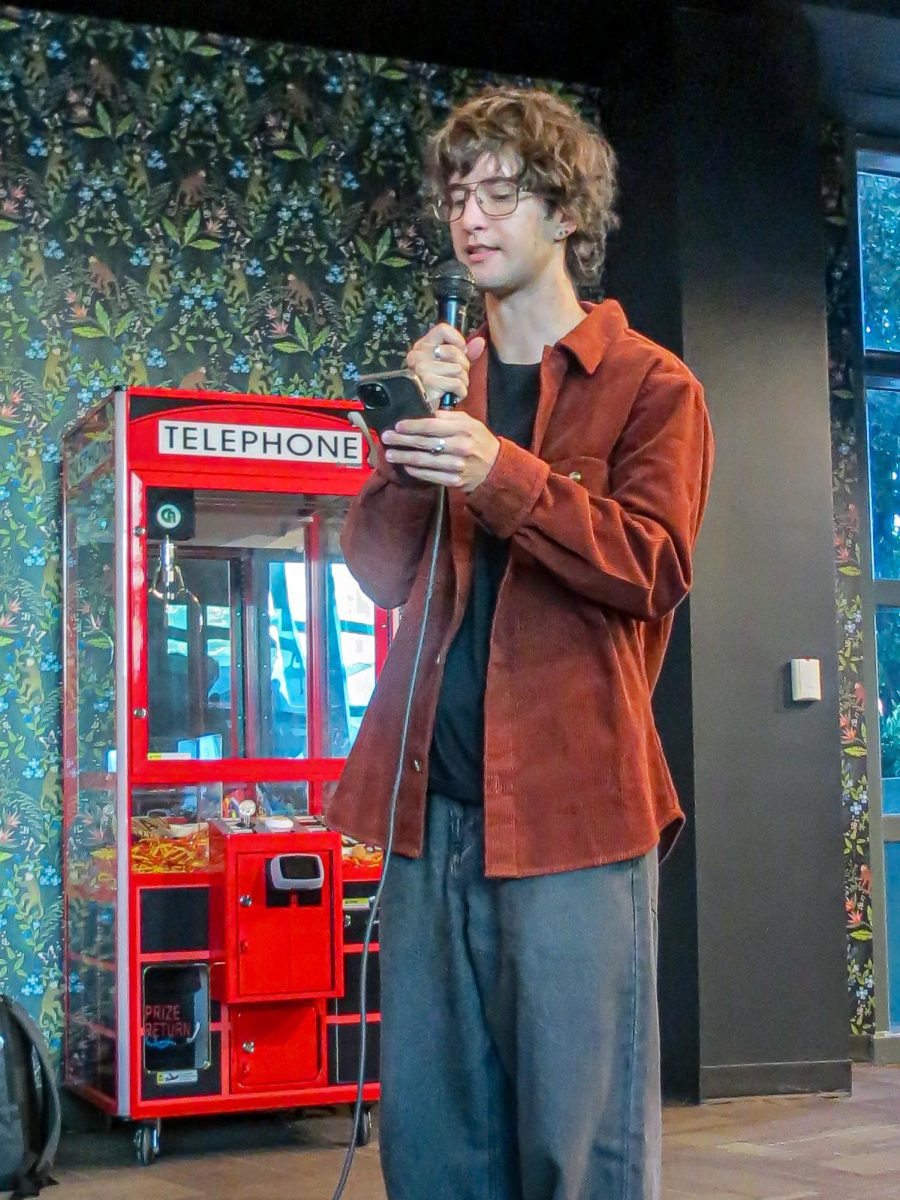
Marigold Nugent
Sophomore biology major Jack Loch reads his story “The Fly” at the Writers’ Guild open mic event. A total of 10 students shared their best pieces.
Last Friday in Arcadia, the Writers’ Guild closed out two weeks of zine creation with an Open Mic Night. A total of 10 speakers spent the night bringing works of literature to life and performing aloud to an eager crowd.
Before the event began, technical difficulties arose with microphone access. According to Writers’ Guild President Tahirih Bochmann and Vice President Aidan Leschen the club’s professional staff contact Assistant Director of Student Life Meagan Degroot was supposed to prepare the appropriate audio-visual (AV) equipment in advance.
When Bochmann and Leschen sought out a microphone, only two students remained in the Student Life office after hours: Associated Student Government’s (ASG) director of external affairs Drew Schuering and the Club Advisory Board’s (CAB) events coordinator Keith Pierce.
Neither student knew that the Writers’ Guild event was happening, nor had they received notice from Degroot. According to Pierce, Degroot left no instructions or equipment for the Writers’ Guild and had been absent for the entire workday. After scouring the Student Life office, Pierce and Schuering found a suitable replacement and set-up the microphone minutes after the event began.
As Arcadia’s blaring playlist wound down, an audience of 24 students and parents listened to Bochmann introduce the evening’s featured speakers. These two readers included managing editor of Pinyon Poetry Ashley Bollinger and senior English major Rory Davison.
Bollinger’s pieces included introspective works ranging in subject matter. Their poem “When The World Is Ending” analyzed images of desolation, destruction and distraction. In contrast, “Graffiti Bikini,” read directly after, revered the appearance of a stereotypically vapid woman.
“‘Graffiti Bikini’ is very short, it’s very weird,” Bollinger said. “Perhaps my favorite poem that I’ve ever written.”
Upon hearing the opening lines of the poem, the audience erupted in laughter.
“She had big boobs like lightbulbs, an orange-cream face,” Bollinger read. “Tattoed with pink profanities and someone’s spearmint.”
Bollinger’s later works focused on harsh experiences at church, romantic break-ups in winter and the contrasts between the mundanities and extremities of life.
After dedicating their final poem, “My Body, Since The Beginning Of Time,” to their mother, Bochmann praised the artistic voice running through Bollinger’s work.
“There is so much humanity in every one of Ashley’s poems,” Bochmann said. “It’s like every poem has its own heartbeat and it’s incredible to listen to every single time.”
Davison’s readings immediately followed Bollinger’s. They established a different tone right away, with jokes about the first poem’s subject.
“I am going to start off with a poem called ‘Inspiration,’” Davison said. “And I’ll let you guess what it’s about. Just know that Ashley’s poetry has more humanity, mine has less.”
Davison’s other poems featured the writer’s affinity for obscure words and chess, with each reading dipping into the macabre. However, Bochmann objected to Davison’s earlier comparison, and stressed that their poetry highlighted the wonderfully weird side of humanity.
Once Bollinger and Davison both finished, eight other speakers took turns breathing life into their own works, as well as those of famous authors.
Two crowd favorites were a dramatic poem about newly uncovered familial complications by Three Sisters Theatre Company member Bekah Khalsa, and a rendition of the comedic beat poem, “Storm,” by CMU acting/directing graduate Caelan Jessop.
The evening concluded with an original piece by freshman physics major Rose Wilscam about the mythological story of Orpheus and Eurydice. Following Wilscam, sophomore pre-criminal justice major Ace Townsend signed up to close the night with three additional poems.
As the Writers’ Guild began thanking the audience for their time, readers and listeners alike gathered to praise the various student performances. Despite a delayed start and technical setbacks, attendees already began asking one another when the next reading would take place.